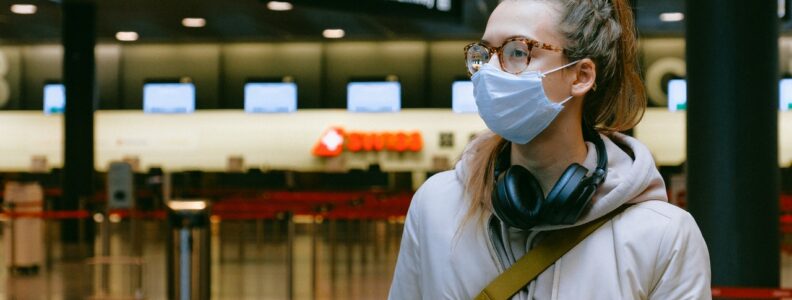
Who Is Exempt from Wearing Masks While Flying?
[Note: Please check your airline and airport for the most up-to-date information on any protocols, regulations and exceptions.]
The U.S. Centers for Disease Control and Prevention (CDC) issued a new mask mandate last week, doubling down on President Biden’s January 21 executive order requiring all people traveling within the United States on any form of transportation to wear masks in an effort to fight against COVID-19.
The order took effect Monday evening and is makes the refusal to wear a mask a violation of federal law, enforced by the Transportation Security Administration (TSA) and other federal, state and local authorities. The rule applies to passengers, conveyance operators and conductors on airplanes, trains, buses, subways, taxis and ride-shares, such as Uber and Lyft. Travelers must wear a mask that covers their nose and mouth properly not only while they are on the mode of transportation, but also while they are getting on and off and in waiting areas, such as airports, train platforms and subway stations. You can read more here.
Additionally, the CDC said some face coverings are not effective enough to comply with the rule. Face shields, bandanas, masks with exhalation vales and masks that do not fit properly do not meet the requirement. Some airlines have also specifically banned gaiters.
However, there are a few exceptions.
The order exempts:
• Children under 2 years of age
• People with a disability who cannot wear a mask, or cannot safely wear a mask, because of the disability as defined by the Americans with Disabilities Act
• People for whom wearing a mask would create a risk to workplace health, safety, or job duty as determined by the relevant workplace safety guidelines or federal regulations
And the requirement to wear a mask shall not apply under the following circumstances:
• While eating, drinking, or taking medication, for brief periods
• While communicating with a person who is hearing impaired when the ability to see the mouth is essential for communication
• If, on an aircraft, wearing of oxygen masks is needed because of loss of cabin pressure or other event affecting aircraft ventilation
• If unconscious (for reasons other than sleeping), incapacitated, unable to be awakened, or otherwise unable to remove the mask without assistance
• When necessary to temporarily remove the mask to verify one’s identity such as during TSA screening or when asked to do so by the ticket or gate agent or any law enforcement official
Before this recent mandate, most airlines did not allow any exceptions during the pandemic, including passengers who had medical reasons for not being able to wear masks. However, with the new rule, several airlines are allowing for more leniency.
For example, American Airlines updated its existing mask requirement to align with orders from the CDC and the TSA. “Beginning Feb. 2, 2021, American will ask customers with disabilities who are unable to wear a mask to notify the airline’s Special Assistance team at least 72 hours prior to departure to request and exemption from the requirement. Exemptions will require documentation from a licensed health care provider, as well as proof of a negative COVID-19 test taken within three calendar days of departure or proof of recovery from COVID-19. Additionally, American will update its guidelines for acceptable mask types to prohibit bandanas and gaiters. Consistent with U.S. government directives, individuals who refuse to wear a mask may be denied boarding, removed from the aircraft or subject to penalties under federal law, in addition to being barred from future travel from American.
Since the pandemic last year, more than 2,500 passengers have been banned for violating onboard mask policies. Flight attendant unions have said a federal rule will make it easier for crews to enforce the requirement.
Before you fly, be sure to check the latest rules for the specific airline you will be traveling so you can be prepared before you arrive at the airport.
If you, or someone you know, was injured due to no fault of your own while traveling or working at an airport or on an airplane, please give us a call (703-796-9555) or email us at Abrams Landau, Ltd.
